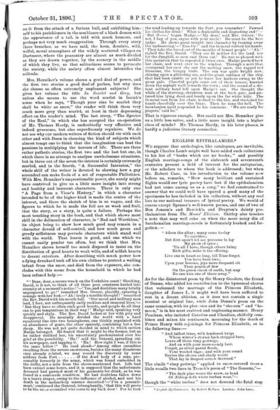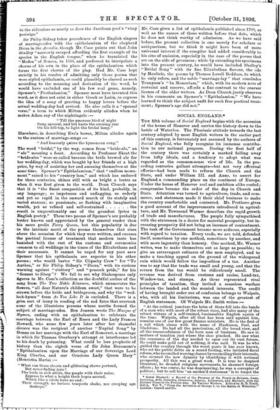ENGLISH EPITHALAMIES.* WE suppose that anthologies, like catalogues, are inevitable,
though Charles Lamb might well have added such collections to his list of "books which are no books;" and possibly
English marriage-songs of the sixteenth and seventeenth centuries present a field of interest for the antiquarian, or the scholars to whom the book is addressed ; but when Mr. Robert Case, in his introduction to the volume now before us, remarks, "How many brilliant and sustained flights would our lyric poetry have lost if the epithalamium had not come among us as a song." we feel constrained to answer that we could well have spared a good many of the specimens he has included in his collection, without any real loss to our national treasury of lyrical poetry. We would of course except Spenser's well-known poems, and one of two of Ben Jonson's and Her' ick's, and Drayton's dainty pro- thalamium from The Muses' Eliziam. Shirley also touches a note that may well echo on when the more noisy din of bacchanalian marriage-revels is fortunately hushed and for- gotten :—
"Adorn the altar ; many come to-day To sacrifice;
But first upon't let me presume to lay My grain of spice ; 'Tie all I have, though others bring Rich gifts, mine is the offering.
Live one in heart so long, till Time forget You have been two ;
Upon your bosoms, joys more frequent sit Than pearls of dew
On the green cheek of earth, but may No sun kiss one of those away."
As for the disinterred poem by Sir Henry Goodere, the friend of Donne, who added his coutribution to the hymeneal chorus that welcomed the marriage of the Princess Elizabeth,
daughter of James I., it might well have been suffered to rest in a decent oblivion, as it does not contain a single musical or original line, while John Donne's poem on the
same occasion, with its phces,ixes and its " she-sun " and "he- moon," is in his most crabbed and unpleasing manner. Henry Peacham, who imitated Catullus and Clandian, skilfully com- bines and mixes his sentiments, mourning for the death of Prince Henry with rejoicings for Princess Elizabeth, as in the following lines:—
" And tallest trees, with tenderest twigs Whom winter's storms hal h stripped bare, Leave off those rimy periwigs,
And on with your more seemly hair. Forget, ye silver paved floods, Your wonted rage ; and with your sound Revive the shcres and shady woods That lay in deepest sorrow drowned."
The simile "rimy periwigs" applied to snow-covered trees a little recalls two lines in Trench's poem of "The Seasons,"—
" The dark pine wears the snow, as head Of LEthiop doth white turban wear,"—
though the "white turban" does not descend the fatal step
• English Epifhalamies. By Robert H. Case. London: John Lane.
to the ridiculous so nearly as does the Jacobean poet's "rimy periwigs." Sir Philip Sidney takes precedence of the English singers of marriage-odes with the epithalamium of the shepherd
Dins in the Arcadia, though Mr. Case points out that John Stadley "narrowly escaped affording the first example of its
species in the English tongue," when he translated the "Medea" of Seneca, in 1566, and preferred to interpolate a chorus of his own in the place of the epithalamium which forms the first chorus of the play. Had Mr. Case kept strictly to his resolve of admitting only those poems that were styled epithalamia, or could plausibly be classed as such according to the meaning and derivation of the word, he would have excluded one of his few real gems, namely, Spenser's " Prothalamion." Spenser must have invented this word, as it does not exist in either Greek or Latin, to express the idea of a song of greeting to happy lovers before the actual wedding-day had arrived. He also calls it a "spousal verge," a term to which Milton evidently alludes when he makes Adam say of the nightingale :—
"Till the amorous bird of night
Sung spousal, and bid haste the evening star On his hill-top, to light the bridal lamp."
Elsewhere, in describing Eve's bower, Milton alludes again to the custom of marriage-songs :—
"And heavenly qaires the hymenican sung."
The word "bridal," by the way, comes from "bride-ale," an "ale" meaning a feast. According to Professor Skeat the " bride-ales " were so called because the bride brewed ale for her wedding-day, which was bought by her friends at a high price, by way of assisting her and amusing themselves at the same time. Spenser's " Epithalaminm," that "endless monu- ment " raised to his "country lass," and which has endured for three centuries, shines still with as bright a lustre as when it was first given to the world. Dean Church says that it is "the finest composition of its kind, probably, in
any language ; so impetuous and unflagging, so orderly and yet so rapid in the onward march of its stately and varied stanzas; so passionate, so flashing with imaginative
wealth, yet so refined and self-restrained the 'result is unquestionably one of the grandest lyrics in English poetry." These two poems of Spenser's are probably
better known and appreciated by the general reader than his more prolix Faery Queen, but this popularity is due
-to the intrinsic merit of the poems themselves that rises above the occasion for which they were written, and excuses the poetical license of treatment that modern taste has banished with the rest of the customs and ceremonies common to all weddings in the times of the Elizabethans and their successors. It cannot be urged for any poet save Spenser that his epithalamia are superior to his other poems ; who would barter "Sir Clipseby Crew" for "To Anthea," or Sir Philip Sidney's " Diens," with its curious warning against " sluttery " and "peacock pride," for his "Sonnet to Sleep "? We fail to see why Shakespeare only
figures in Mr. Case's collection as the doubtful author of the song from The Two Noble Kinsmen, which enumerates the
flowers, "all dear Nature's children sweet," that were to be
strewn before the bride and bridegroom, and why the "wed- lock-hymn " from As You Like It is excluded. There is a grim sort of irony in reading of the sad fates that overtook
some of the illustrious persons whose merits formed the
subject of marriage-odes. Ben Jonson wrote The Masque of Hymen, ending with an epithalamium to celebrate the
'marriage between the Earl of Essex and the Lady Frances Howard, who some few years later after her shameful -divorce was the recipient of another "Nuptial Song" by Donne on her marriage with the Earl of Somerset, a marriage in which Sir Thomas Overbury's attempt at interference led to his death by poisoning. What could be less prophetic of history than the eighth verse of Sir John Beaumont's " Epithalamium upon the Marriage of our Sovereign Lord King Charles, and our Gracious Lady Queen Mary" (Henrietta Maria) :—
"What can these shouts and glittering shows portend, But never-fading joys ?
The lords in rich attire, the people with their noise, Express to what a height their hopes ascend, Which like a circle have no end: Their strength no furious tempests shake, nor creeping age destroys?' Mr. Case gives a list of epithalamia published since 1700, as well as the names of those written before that date, which he does not think worthy of admission. As we have said before, the present collection is one merely for scholars or antiquarians, but we think it might have been of more universal interest if the compiler had added considerably to his sins of omission, especially in the case of the poems that err on the side of grossness ; while by extending his specimens into the present century, he would have included Shelley's "Bridal Song" with its fine Elizabethan flavour, the ode by Moultrie, the poems by Thomas Lovell Beddoes, to which he only refers, and the noble "marriage-lay" that concludes Tennyson's "In Memoriam," which, with its modern note of restraint and reserve, affords a fine contrast to the coarser license of the older writers. As Dean Church justly observes in his comments on Spenser's "Epithalamion," "We have learned to think the subject unfit for such free poetical treat- ment; Spenser's age did not."











































 Previous page
Previous page